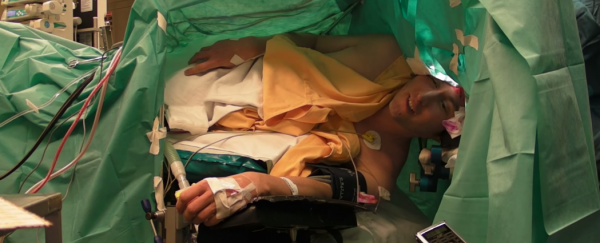The thought of someone being conscious during their own brain surgery - let alone performing the great works of Schubert - sounds fairly ghoulish, but it's actually the safest way to monitor the patient's condition, as Slovenian tenor Ambroz Bajec-Lapajne demonstrates in the footage above.
Having been diagnosed with Glioblastoma multiforme (GBM), which is one of the most aggressive types of malignant brain tumour, Bajec-Lapajne checked into a Dutch hospital in June 2014 to have it removed. And lucky for him, neurosurgeons are so incredible these days that not only can they perform this life-saving surgery, they can take measures to ensure that it doesn't mess with his livelihood.
Known as awake brain surgery or intraoperative brain mapping, the procedure allows neurosurgeons to remove tumours that would otherwise be inoperable, for example if they're buried too close to the regions of the brain that control language, movement, and vision, or if their borders aren't clearly defined, such as in some types of gliomas.
The patient's scalp is completely anaesthetised and they can either be awake for some or all of the procedure, often while heavily sedated to avoid stress. As the Johns Hopkins website explains, the neurosurgeon will stimulate the area around the tumour with small electrodes, and while doing so, the patient will talk, count, and look at pictures so brain function can be monitored.
When it comes to musicians, they often prefer to do what comes most naturally, with this guy playing The Beatles on the guitar during his brain surgery, and this guy playing the violin. Bajec-Lapajne chose to perform Franz Schubert's "Gute Nacht" during his procedure.
"In Bajec-Lapajne's case, doctors wanted to monitor his ability to recognise changes in key, since that's something he relies heavily on for his profession," Rachel Feltman writes for The Washington Post. "Singing is also a good task to help doctors avoid hurting speech areas - which is why some musicians choose to play guitar and sing during their surgeries instead of more traditional tasks like reading and answering questions."
The neurosurgeons at the University Medical Centre Utrecht in the Netherlands were able to map out which parts of Bajec-Lapajne's brain could be severed and which parts needed to be left alone, at which point he was put under for the removal of the tumour.
And as you can see in the video above, it becomes pretty obvious when they hit a risky region. "I sing two (first and last) couplets of Schubert's lied "Gute Nacht": the minor - major transition in order to see if I can still recognise the key change," says Bajec-Lapajne on his YouTube page. "All is fine until min. 2:40 when things start to get very interesting…"
I won't spoil it, but it's fascinating to see how suddenly things change in their singer's stunning performance (imagine him at full capacity!). Thankfully, Bajec-Lapajne reports that a year later, he's doing fine, and continues to sing professionally.
For those of you who were expecting a bit more actual brain surgery in the footage above, MIT doctoral student Steven Keating has got you covered. Earlier this year, he filmed his own brain surgery in an effort to 'demystify' the procedure. "If you view things as a curious problem instead of a scary problem, it can make a huge difference," he said at the time. If only we could be half as brave! Check it out below:
